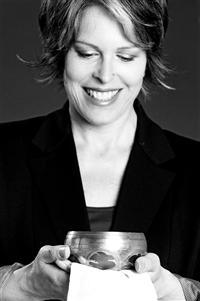Early on in February, I ran into Vancouver-based celebrant, Michele Davidson through Twitter. It was one of those completely by accident online meetings but one that you get the sense was meant to be. Along with celebrating all the usual major events in life, Michele creates divorce ceremonies. The very name struck a chord bringing to mind something spiritual, intentional, honorable – a way to bring closure and a new possibilities. To me, ending a marriage with a meaningful ritual sounds incredibly healing and it is very different from a divorce shower or divorce cake. Here’s Michele to explain:
Ending a marriage that once began with such hope and promise can feel like a death. Isn’t it curious that our culture has a ceremony to begin a marriage, but nothing to observe its undoing? That we hold a memorial to mourn a loss through death, but have nothing to help us mourn the loss of our marriage.
 And yet, as with all significant life experiences, divorce holds the potential to transform the lives of those who go through it. There is no denying that it’s a painful journey, one that takes courage and a personal commitment to healing.
And yet, as with all significant life experiences, divorce holds the potential to transform the lives of those who go through it. There is no denying that it’s a painful journey, one that takes courage and a personal commitment to healing.
There is a trend gathering steam that supports those living through divorce in a deeply meaningful way.
A Divorce Ceremony mindfully unbinds the emotional ties of a relationship in a way impersonal legal paperwork simply cannot possibly address. This unbinding of emotional ties supports individuals to embrace the future with hope and to step forward into a new chapter of their lives.
A Divorce Ceremony can be a transformational part of the healing process, helping to acknowledge the good parts of the marriage and not to reject it outright. It’s important to remember that an ended marriage does not mean that the entire relationship was a failure. In virtually every marriage, no matter how dysfunctional, lie lessons and blessings.
But do let me be very clear on two points.
Divorce ceremonies are not to be confused with divorce parties, which are often about revenge and covering up resentment. Sure, throwing darts at a photograph of your ex while inebriated friends cheer you on may hold appeal for some, but such actions do nothing to address and heal deeper wounds.
Secondly, one must be well and truly ready. This is why a Divorce Ceremony is often not appropriate until well after the marriage is legally over. It takes time to view the relationship with forgiveness and conciliation.
I find my most powerful experiences leading Divorce Ceremonies have been with individuals two years after their divorce. It takes that long (or longer) to emerge from grief and truly be ready to embrace a new way of being.
Through the reflective work we do to develop the ceremony, the individual comes to inwardly acknowledge the blessings of the marriage and the opportunities that lie ahead as the result of its conclusion. During the ceremony, the honoree does something deeply symbolic to outwardly manifest this acceptance.
This can take the form of clipping the edges of a marriage certificate to symbolically render it null and then making pledges for one’s future, reworking a ring, or gifting. When the union has brought children into the world, there are various ways to signify intention to interact respectfully with one’s former spouse. Weaving together all these threads is good old-fashioned story telling. The telling of an individual’s emotional journey in a way that is neither self-indulgent nor dismissive. Honest and real are the way to go.
Typically a small but close group of family and friends are invited to attend the intimate ceremony. Without exception it is my experience that guests (I like to think of them as participants) are surprised to find that the ceremony provides a safe place for them to process whatever feelings they themselves hold around this divorce.
By witnessing a ceremony that recognizes divorce with compassion and forthrightness, there is the chance to address the importance of acknowledging the deep communal impact of this life transition. Frequently, participants who themselves are divorced say it was helped them reframe their personal experience.
Interested in creating your own divorce ceremony? You can Google Celebrants in your area. Celebrants are professionally trained ceremony specialists with a deep understanding of rites of passage such as divorce. She or he will work with you to create a personal ceremony for you, one that reflects your experiences and personality.
You may also want to pick up Marianne Williamson’s lovely book Illuminata: Thoughts, Prayer, Rites of Passage. In her chapter on divorce, Williamson wisely suggests prayers of forgiveness and release. I find inspiration in her suggestion that each spouse say to the other in turn:
“I bless you and release you. Please forgive me; I forgive you. Go in peace. You will remain in my heart.”
The Divorce Coach Says
I was interested to read Michele’s recommendation of the timing for a ceremony being two years – I’m not at all surprised by this. It’s coming up to four years since my divorce and I’m still blaming myself! I also liked Michele’s comments about recognizing the value of your marriage. This is another area I’ve struggled with – just because the marriage ended doesn’t mean it was failure or that you failed. If you try to wipe it out as if it never happened, it just creates a void.
Would a divorce ceremony have helped you? Would it help you now? Have you attended one?
Thanks again to Michele for this guest post. You can read more about Michele at her blog, Michele Davidson Modern Celebrant .